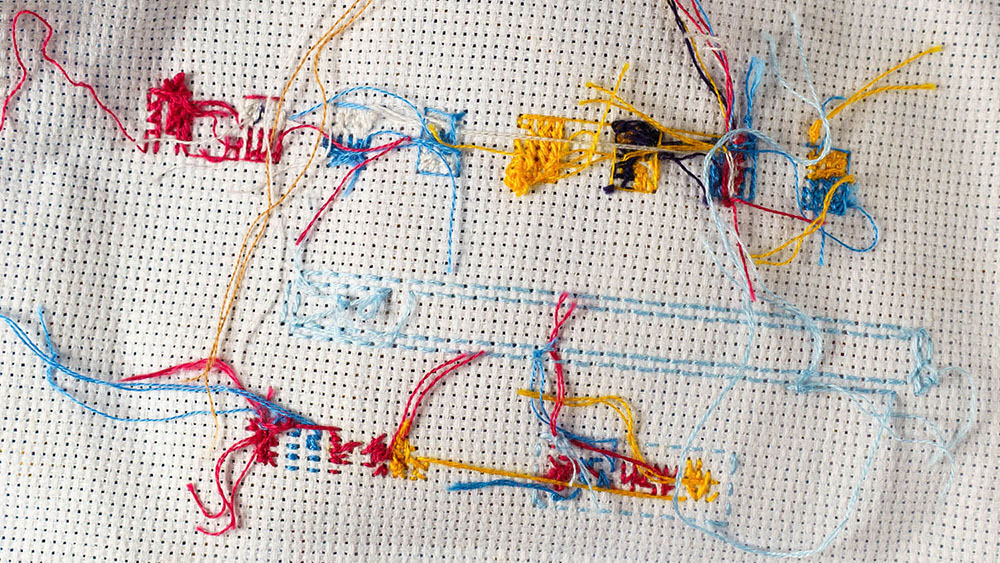The past seven months of my life have been subsumed with an interest in Buddhist histories, philosophies, and cultures. It's evolved from a mild curiosity into an “everywhere I go, I see him” kind of situation. I think this is a common experience amongst those who find themselves immersed in the dharma. Naturally, this translated into the mindset I adopted when writing the game and my approach to the background research.
In many ways this manifested plainly into the text: for example, the two monologues near the end of the game are titled THUS I HAVE HEARD, which, if you have read any of the sutras, you'll recognize as an opening line as common as “once upon a time,” an opening line which indicates that the following words are the true ones of the historical Buddha Shakyamuni. But did Erica and Nicole really tell Alba what happened that day in the old cannery? If so: the reports contradict one another, don't they? Alba clearly knows enough of the Buddhist corpus to quote directly from it in her retelling of FC's final chapter, but her understanding or faith in the ideas is undetermined.
Other Buddhist ideas found their way into the three heroines and helped shape their worldviews and characterization.
Erica is presented as a stubborn, hard headed girl, but as the plot moves forward, it becomes clear that she's simply the type who has to overcome immense inertia. She can only see a short distance in front of her, but she feels no choice but to accept the facts of what she sees. And of all the characters, Erica has the clearest understanding of the nature of things, even if she's not aware of that understanding. In EXIT INTERVIEW, she deems FC a “superimposed name atop a system of disparate parts,” echoing the core idea of the five aggregates. She also acknowledges that her conception of the island is merely conventional, hinting earlier, at the cemetery, at an awareness of the other of the two truths: that FC, like everything, is empty of inherent characteristics. A real Madhyamika! But the idea goes over Alba's head, and her response of 'Sadhu, sadhu, sadhu!' is purely facetious.
An easter egg at the end of Erica's monologue: her fourfold negation of seeing Alba. This is a tetralemma, a logical structure famously employed by Nagarjuna in his Root Verses to defend the theory of universal emptiness.
Nicole embodies a separate idea from the Mahayana: the concept of instant enlightenment, a foundational idea of Zen/Chan. This lines up with her blossoming adulthood. Nicole's sudden thrust into the “real world” coincides with the end of life on FC, and while she stumbles hard, she's forced to adapt quickly. It's not instant in the way that a Zen practitioner might experience, but similar to the sudden insight one might gain via koan contemplation, her maturation bursts forth from the disruption of the island's discursive lifestyle. Amidst the ring/cycle/circle motif at the end of her monologue, Nicole appeals to the “artist of the oxherding pictures,” a series of images which depict the classical Zen path to awakening and bodhisattvahood. Yet much of her childish demeanor is retained despite all the changes. Alba is shocked when Nicole shows her wisdom and compassion in A AND B -- indeed, she's fundamentally unchanged, now simply expressing the (buddha)-nature inherent to her. She sticks around to help; she hasn't simply vanished into mahaparinirvana upon her adulthood.
Even Jinny gets a chance to sideline Alba in [traveller], when she chides Alba for her incessant reference to other texts, claiming that this practice creates "a model of a database that hides its own lack of substance behind every part's dependency on another." This is arguably true in a critical sense, but it also mirrors the Madhyamaka defense of universal emptiness: dharmas arise based on other dharmas and therefore have no intrinsic nature, being defined entirely by their relationship to one another.
At the beginning of [postscript], Alba gives a deluded rendition of a classic parable comparing the dharma with a raft (in this case, the ferry back to Canada), which must be left behind at the riverbank in order to move forward: the message being that one can grow too attached to the teachings, that that attachment begets suffering, and so on. Despite the embedded warning, Alba's mind remains fixated on FC and on Jinny, even into the future when she's telling this story.
As she knocks frantically on Jinny's door, the sound effects shift into the rhythmic beating of a mokugyo, and she ends with an ideologically incoherent invocation of the Heart Sutra's final phrase: gate gate paragate parasamgate, bodhi svaha.
“Gone, gone, gone to the other shore, gone beyond to the other shore, enlightenment, hail!”
---
